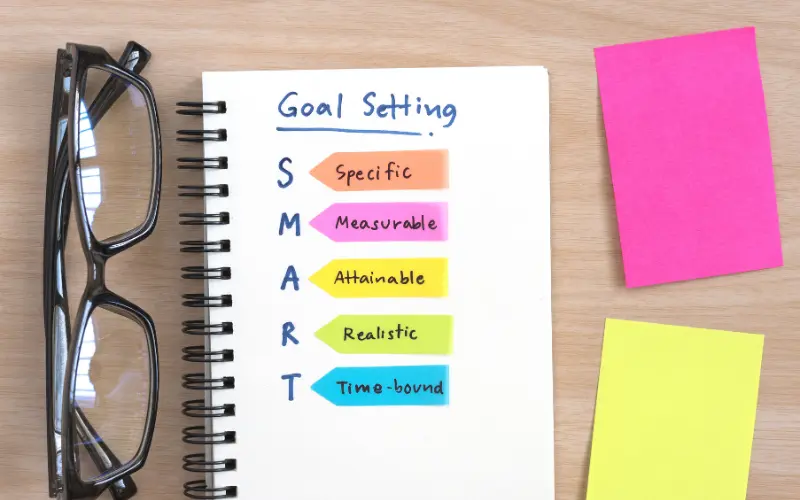You wake up in the morning ready to tackle the day ahead. So you sit at your desk, open your laptop, and start work. You have a long to-do list and a lot of tasks to accomplish. But you need help figuring out where to start.
You know you want to succeed in your business, but you must figure out how. You have big dreams and goals, but they seem impossible to reach. As a result, you feel overwhelmed, frustrated, and stuck.
You’re not alone.
As a business owner, it’s easy to feel like you’re on your own, trying to figure everything out yourself. But the truth is, every successful entrepreneur has faced the same challenges and obstacles you’re facing.
The key to success is goal setting for business owners. Setting clear, specific, and achievable goals can create a roadmap for success and help you achieve your dreams as a business owner.
In this blog post, I’ll review the steps you can take to create a roadmap for success and achieving your goals. From defining your vision to breaking your goals into smaller tasks, tracking your progress, and staying accountable, I’ll provide actionable tips and advice to help you succeed in your business.
So don’t give up on your dreams. You can succeed as a business owner with the right mindset, tools, and strategies.

Goal Setting for Business Owners Step 1: Define Your Vision
Before starting goal setting for business owners, you must define your vision. Your vision is what you want your business to become in the long term. It’s the ultimate destination you’re striving for. Defining your vision is essential because it helps you stay focused on what’s important and ensures you’re setting goals aligning with your long-term vision.
Think about where your business will be in five or ten years. What do you want your business to achieve? What impact do you want to make on your industry or community? Then, take some time to reflect on your ultimate goal for your business. You can set relevant and meaningful goals by having a clear and specific vision.
Ensuring that your goals align with your vision and move you closer to achieving it is essential. This will help you stay motivated and ensure that you’re not just goal setting for business owners for the sake of it. Your vision should be at the forefront of everything you do in your business, guiding your decisions and actions. When you have a clear vision and purpose, you’re more likely to stay committed and motivated to achieving your goals.

Goal Setting for Business Owners Step 2: Set SMART Goals
Now that you have a clear vision, it’s time to set some SMART goals. SMART stands for Specific, Measurable, Achievable, Relevant, and Time-bound. Here’s what each of these components means:
Specific: Be Clear and Specific
Your goals should be clear and specific. This means that you need to define what you want to achieve clearly. Instead of saying, “I want to make more money,” be specific and say, “I want to increase my revenue by 20% in the next six months.” By being particular, you can focus your efforts and track your progress more quickly.
Measurable: Track Your Progress
Your goals should be measurable, meaning you should have a way to track your progress and determine whether or not you’ve achieved your goal. For example, if your goal is to increase your revenue, you should have a way to track your revenue over time. Use metrics and KPIs to track your progress and adjust your strategy accordingly.

Achievable: Be Realistic
Your goal setting for business owners should be achievable, which means they should be challenging and within reach. If your goals are too easy, you won’t be motivated to achieve them. On the other hand, if they’re too difficult, you’ll become discouraged. Set goals that stretch you but are still achievable.
Relevant: Align with Your Vision
Your goals should be relevant to your business and your vision. Make sure your goals align with your long-term vision for your business. For example, suppose your vision is to create a company that allows you to provide for your family while positively impacting the world. In that case, your goals should reflect that vision.
Time-bound: Set a Deadline
Your goals should have a deadline. This will help you stay motivated and focused on achieving your goal. Set a deadline for each goal and create a plan for achieving it. This will help you stay on track and ensure that you’re making progress toward your vision.

Some examples of S.M.A.R.T goals are:
Specific: “I want to launch a new product line of eco-friendly skincare products in the next six months.”
Measurable: “I want to increase website traffic by 25% in the next quarter.”
Achievable: “I want to double my monthly revenue within the next year by improving my sales process and launching a new marketing campaign.”
Relevant: “I want to expand my business to new markets and increase my customer base by 50% within the next two years.”
Time-bound: “I want to complete my new website design and launch it by the end of the month.”
“I want to increase my social media engagement by 50% in the next three months by posting daily, responding to comments and messages within 24 hours, and running a social media contest to encourage user-generated content.”
This goal is specific because it outlines the actions needed to achieve it. It is measurable because it has a quantifiable metric. It is achievable because it’s realistic, relevant to the business, and time-bound because it has a set deadline.

Goal Setting for Business Owners Step 3: Break Your Goals Down into Smaller Tasks
Now that you have your SMART goals, it’s time to break them down into smaller tasks. This will make your goal setting for business owners more manageable and help you stay motivated as you achieve them.
Start by breaking your goals into monthly, weekly, and daily tasks. For example, if your goal is to increase your revenue by 20% in the next six months, you might set a goal to acquire two new clients each month. Then, you can break that down further into smaller tasks, such as reaching out to potential clients, creating a sales pitch, and following up with leads.
Here are some actionable tips to help you get started:
Use a planner or calendar to map out your goals:
A visual representation of your goals and the tasks needed to achieve them can help you stay organized and focused. Use a planner or calendar to schedule monthly, weekly, and daily tasks, and allocate enough time to complete each task.
Prioritize your tasks:
Not all tasks are created equal. Some are more important than others, and some are more urgent. Therefore, prioritize your tasks based on their importance and urgency. This will help you stay focused on the most essential tasks and prevent you from getting overwhelmed.

Set deadlines:
Deadlines are a great way to stay motivated and focused. Set deadlines for each task and make sure to stick to them. This will help you stay on track and avoid procrastination.
Celebrate your successes:
Celebrating your successes along the way can help you stay motivated and energized. When you complete a task or achieve a milestone, take a moment to acknowledge and celebrate your accomplishment. This will help you stay positive and focused on achieving your long-term goals.
Remember, breaking your goal setting for business owners into smaller tasks is essential to success. By using a planner, prioritizing your tasks, setting deadlines, and celebrating your accomplishments, you can stay motivated and focused as you work towards achieving your goals.

Goal Setting for Business Owners Step 4: Track Your Progress
Tracking your progress is crucial if you want to achieve your goals. Ensure you can track your progress toward your goals through a spreadsheet, a planner, or a project management tool. Here are some actionable tips to help you track your progress and stay on top of your goals:
Use a project management tool:
There are many project management tools available that can help you track your progress and manage your tasks. Find a tool that works for you and use it to keep track of your goals and tasks.
Keep a journal:
Keeping a journal can help you track your progress and reflect on your successes and setbacks. Please write down your goals, tasks, and progress, and use it to stay motivated and focused.
Review your progress regularly:
Set aside weekly time to review your progress and adjust your goals and tasks. This will help you stay on track and avoid falling behind.
Learn from setbacks:
Setbacks are a natural part of any journey. When you encounter a setback, please take it as an opportunity to learn and improve. Reflect on what went wrong and use it to adjust your goals and tasks.
Set aside weekly time to review your progress and adjust your goals and tasks. Celebrate your successes and use your setbacks as learning opportunities to help you improve.

Goal Setting for Business Owners Step 5: Stay Accountable
Staying accountable is essential to achieving your goal setting for business owners. There are a few different ways you can stay accountable:
Find an accountability partner:
Having someone to hold you accountable can be incredibly beneficial. Find someone you trust who can keep you responsible for your goal setting for business owners. This could be a friend, family member, colleague, or fellow entrepreneur. Set up regular check-ins to discuss your progress, share feedback, and offer support.
Start by contacting friends, family, colleagues, or fellow entrepreneurs in your industry. You can also join networking groups, online communities, or Facebook groups to connect with other entrepreneurs. Look for someone supportive, trustworthy, and committed to helping you achieve your goals.

Use a coach or mentor:
A coach or mentor can help you stay accountable and guide you toward achieving your goals. In addition, they can offer valuable feedback, support, and guidance as you work toward your long-term vision. Consider investing in a coach or mentor to help you stay accountable and achieve your goals faster.
Start by researching coaches and mentors in your industry or field. Look for someone with experience and expertise in areas relevant to your goal setting for business owners. You can also ask for recommendations from other entrepreneurs or use coaching directories to find a coach that fits your needs.
Join a mastermind group:
A mastermind group is a group of like-minded entrepreneurs who come together to support each other and hold each other accountable. This can be a great way to connect with other entrepreneurs, share ideas, and stay motivated.
Look for mastermind groups in your industry or field by searching online or asking for recommendations from other entrepreneurs. You can also start your own mastermind group by contacting other entrepreneurs in your network and inviting them to join.

Share your goals publicly:
Sharing your goals publicly can be a powerful way to stay accountable. Consider posting your goals on social media, your website, or a blog post. This will help you stay responsible and receive feedback and support from your followers.
Remember to take the time to find the right accountability partner, coach or mentor, or mastermind group that fits your needs and goals. With the proper support and accountability, you can achieve your long-term vision for your business.
Setting goals is crucial if you want to succeed as a business owner. By defining your vision, setting SMART goals, breaking your goals into smaller tasks, tracking your progress, and staying accountable, you can create a roadmap for success and achieving your goals
Remember, goal setting for business owners is a process that takes time and effort. Feel free to adjust your goals and tasks and celebrate your successes. You can create a successful and thriving business with a clear vision, SMART goals, and a plan to achieve them. If you need some productivity tips to help get your goals accomplished, take a look at my article, which goes over 15 productivity tips specifically for business owners!
